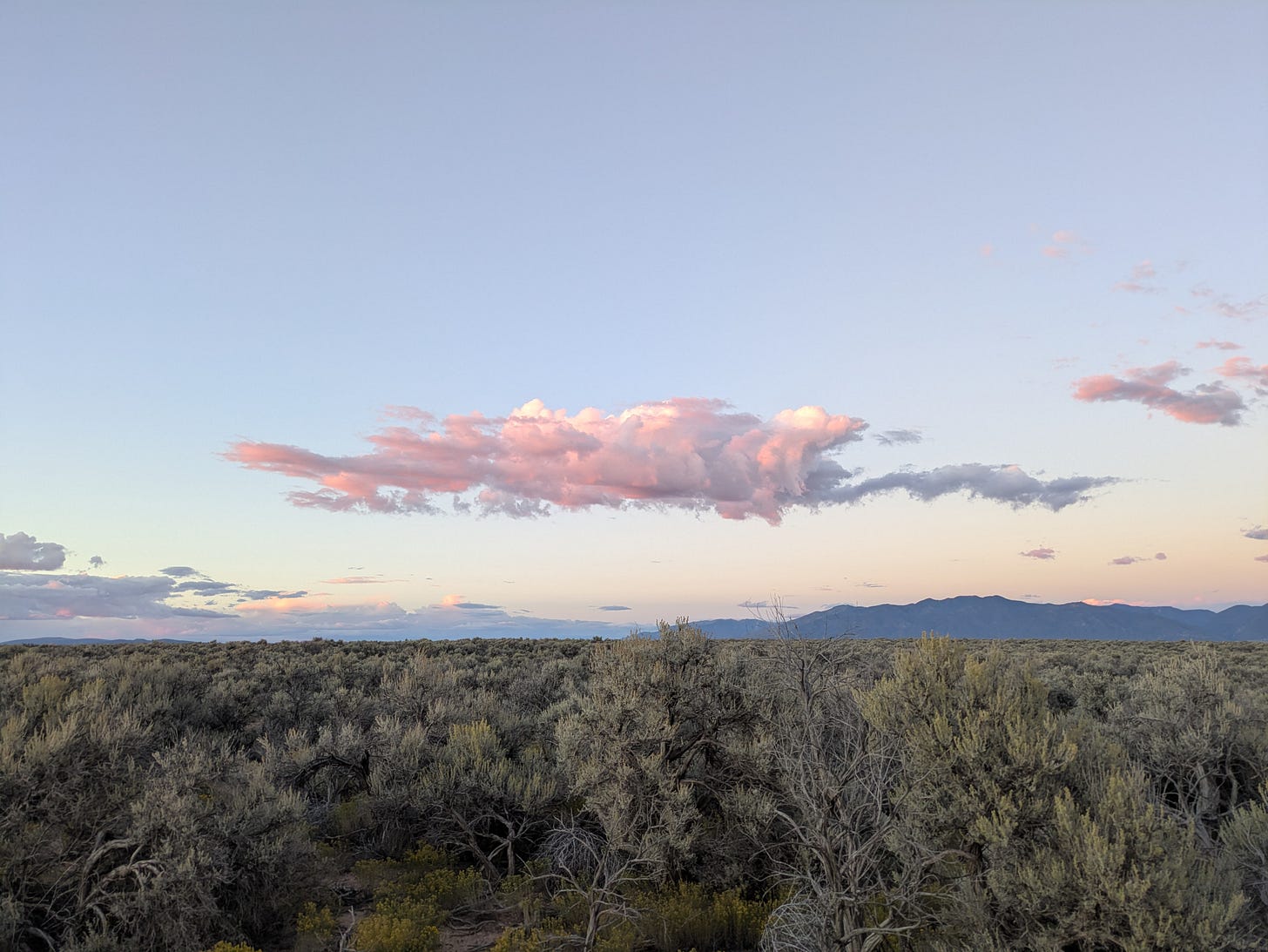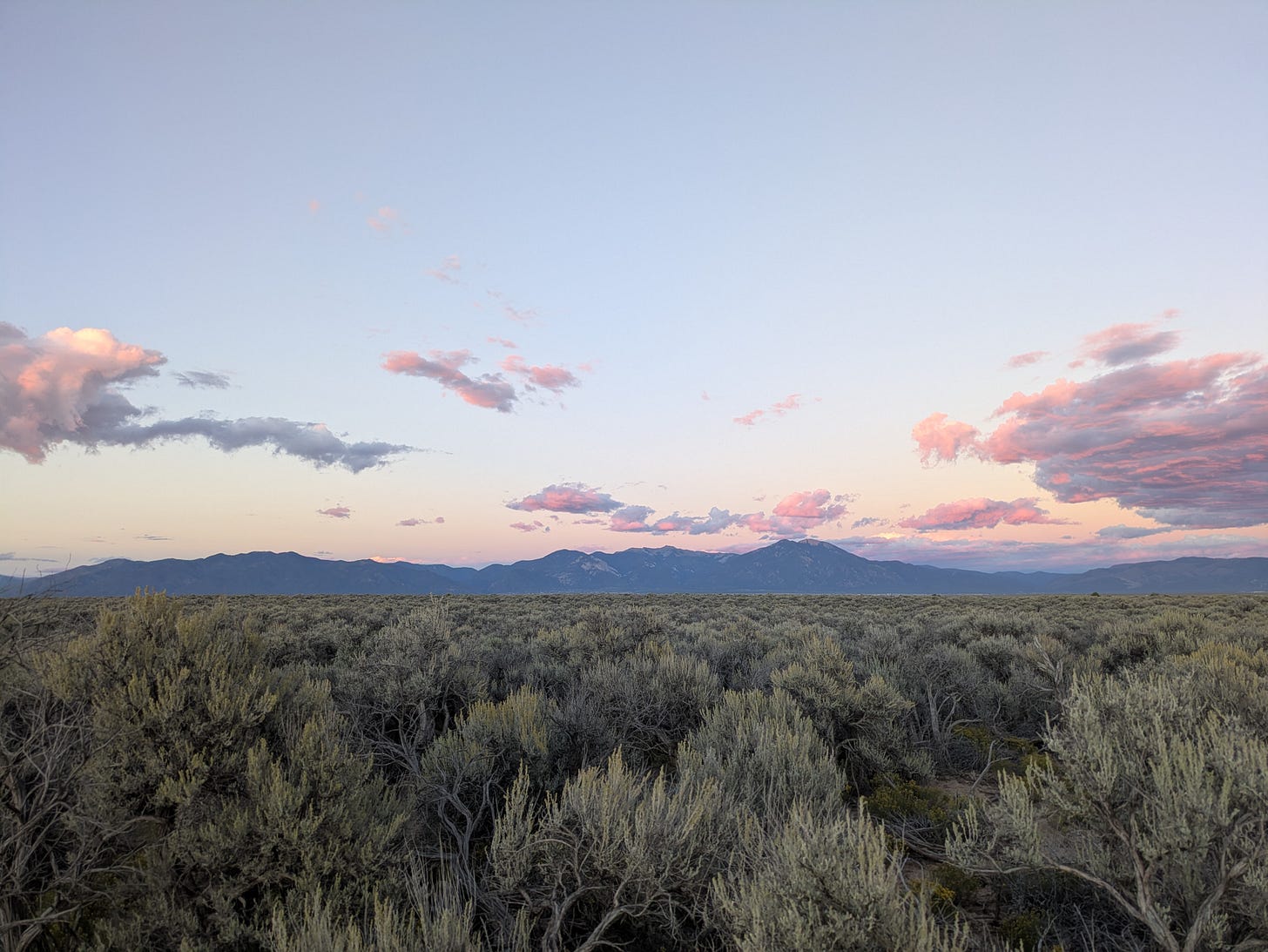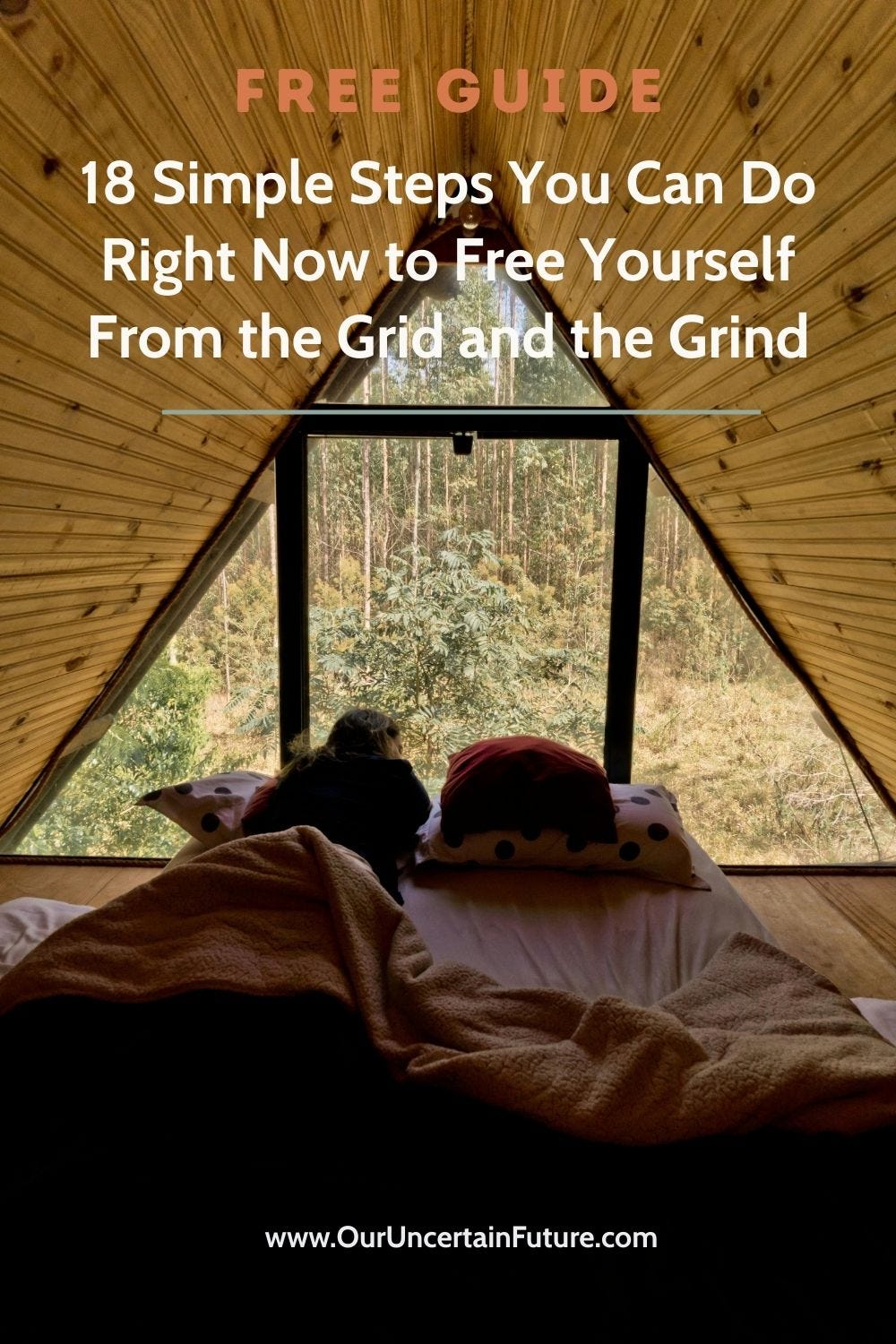I Don’t Want to Make Money Doing What I Love
On seeking a slower, easier pace of life
The Viral Note: Rejecting Passion as Commodity
Last week I posted this Note (a term for a feed post on Substack) about what I am calling work-life-money balance and it went viral:
It reads: I don't want to make money doing what I love. I don't want to commodify my art, my passions or my spirituality. I'm happy to have an easy job that pays well and plenty of free time to do what I love. If I can be of service, even better. I don't want a career. I don't want to build my resume. I don't want to “be seen.” I want a happy life with love and ease, close to the land, writing and making art. I'm not impressed by celebrities or fame. In fact, I find that ostentatious and ridiculous. I'm sick of homogeny. I want good books and inspired art and wild tales and noisy rivers. I'm not even writing this for you; I'm saying it out loud like the eleven ravens I saw at dusk, cawing to no one at all.
As of this writing, it has 1.9K likes, 73 comments and 146 reposts. We received about 100 new subscribers from this post alone. For our little Substack account of 1.5K subscribers, this is huge.
Funnily, I scribbled this note off in a hurry at a moment of exacerbation after seeing something online about making a living doing what you love that annoyed me so much, I had to say something. I never expected this kind of response.
I feel like this response deserves a deeper dive into what about this Note resonated so strongly with so many people. Does it reflects the times we live in?
Nostalgia for the Easy, Stable Job: What Changed?
Once upon a time in post-industrial America, there lived a nuclear family. In this nuclear family, the husband could go to his work at a corporation or factory and make a well enough living to support his family and pay his mortgage and have good health and retirement benefits while his wife stayed home with the children. As years passed, and the women’s liberation movement ingrained itself in mainstream life, women were also able to work at professional full-time jobs with similar expectations (except they would be paid less). These jobs became more available and soon women felt pressure to work outside the home as the cost of living rose and dual income homes became necessary to pay the bills.
In the early 2000s, factories and call centers closed as everything was outsourced overseas and multitudes of blue-collar jobs were lost. Workers became unemployed and destitute, wondering what the heck just happened? In time, society went online and morphed. Households looked different. Freelance and contract jobs with no benefits proliferated. White-collar jobs became more common and higher education more necessary.
During the main pandemic years we saw underpaid service workers taking the brunt of society’s burden. Post-pandemic, many jobs became remote, and the cost of living and housing increased so rapidly that those same service workers couldn’t afford to live in towns they serviced. Now AI is taking away many of those white-collar jobs from the overly-educated.
That singular job that takes you through to retirement and feeds a family of five with benefits is rarer than ever. According to the Pew Research Center, very few Americans hold the same job from entry to retirement. Median tenure for all workers was about 4.1 years. Lifetime employment with one employer is a relic of a bygone era. According to last year’s Dayforce Living Wage Index, only 56% of U.S. full-time workers earn a living wage capable to support a family, and even fewer have benefits sufficient for a large household.
What all this amounts to is more hustle and less job satisfaction.
The 40-Hour Workweek: Still Relevant or Outdated?
This got me wondering about the 40-hour work week. When I went to my dentist and the hygienist was talking about how tired she was, I wished she could afford to work part-time so that she was always fresh and excited to clean my teeth. Why should she have to work all day long 5 days a week?
During the Industrial Revolution, laborers were working 80-100 hours a week, basically every minute of their lives were being pumped into oiling machines for wealthy capitalists. The 40-hour work week was considered reform thanks to labor unions fighting for better standards; 8-8-8, 8 hours of work, 8 hours of sleep, 8 hours of rest. But when I think about the idea that one third of your life or 50% of your waking life is spent working a job, it blows my mind. Yes, we need to make money to live. This is because we moved away from farming, bartering, and trades that are directly connected to need. Our modern world has become so abstract that the jobs we do have nothing to do with our livelihoods (shelter, food, clothes) other than that they give us currency to live.
That’s why people want jobs that they enjoy, because they spend 50% of their lives doing them. This brings me back to the Note. “I don’t want to make money doing what I love. I don't want to commodify my art, my passions or my spirituality. I'm happy to have an easy job that pays well and plenty of free time to do what I love” This sentiment comes after a year of unsuccessfully looking for remote work to supplement my other four part-time jobs teaching yoga and writing content. It seems like everyone is touting this ideology that I should follow my passion and the money will follow.
The True Cost of Commodifying Creativity and Passion
The problem is I spent decades doing low-paying work, following my passion and building my resume and all that got me was more low-paying work. Dr. Erin A. Cech in her book The Trouble with Passion discusses how jobs often exploit workers, paying them less in exchange for the gift of pursuing their passions. “Employers may knowingly exploit the passion of the people who work for them. ... If employers benefit (and profit) from labor that workers put in because they are passionate about their work, without compensating that labor, that is part of the exploitation of passion,” she says in the Culture Study Substack.
My industry has changed in part thanks to academia and in part thanks to AI and the jobs that were previously available to me are no longer or the pay is unlivable. Now, I want work that pays me. Because that’s what it is after all, a job for money. I live off the grid, grow food, catch my own water and create electricity from the sun. I don’t need a job to feed me; I need a job to pay me.
On the Work Better Substack, writer Nick Moore says, “…Work can provide satisfaction, a level of pleasure that isn’t passion or love but is much better than drudgery and tedium. And if I only ask for satisfaction, then I can do work that pays better than work meant to fill my soul.”
I can fill my own soul, thank you. I only need the free time to do so. And that’s why I need to be paid sufficiently enough.
Additionally, I don’t want to turn all my passions into money. Something happens when we commodify what we love; the creative life force is sucked out of it when the end goal involves exchanging dollars. There’s nothing wrong with that of course; I’m jubilant every time one of my collage prints sell. But it is not fair to my art and creativity to rely on it to feed me. This is a burden that my muse can be free of. I want a separation between work and life. A study in the Netherlands found that among self-employed and passion-driven workers there are less work-life boundaries, which leads to decreased happiness, increased emotional exhaustion, and difficulty maintaining healthy lifestyle behaviors.
The Myth of Fame
The second part of the Note: “I don't want to ‘be seen.’ I want a happy life with love and ease, close to the land, writing and making art. I'm not impressed by celebrities or fame. In fact, I find that ostentatious and ridiculous. I'm sick of homogeny,” refers to the freelance entrepreneur culture that insists we post on social media all the time and get as many followers as we can so that we can gain enough notoriety for people to pay us.
I did this route for a few years during the pandemic, selling digital courses online, looking for another way to make money. But in the end, my favorite part was writing the content and so now I keep this Substack and offer my content writing skills to others for a fee. I got tired of trying to convince strangers to “look at me.” I felt like I was in a hierarchy of high school cliques trying to be part of the in-crowd so they would allow me on their podcast. I was losing the point of my goal, which was to connect people with the natural world, not become more popular online with strangers.
I don’t need to be famous in any circle to validate my existence or worth. In fact, the idea exhausts me. That’s why I ended my note by saying, “I'm not even writing this for you; I'm saying it out loud like the eleven ravens I saw at dusk, cawing to no one at all.” Because it was true, I needed to write that for myself.
The pull of the comparison culture is strong, but it’s also ridiculous. Nowadays, I am barely on social media and if I am, it is to promote something, usually local, or see what my real friends are up to. I am disgusted by the political vitriol that goes on and the overall homogeneity of everyone trying to fit in with the cool kids. I prefer to meet up with my friends in person and drum, sing, write, discuss books and life, dance, and eat. I’d rather be in the forest.
Defining The “Easy Job That Pays Well” for Yourself
I got quite a few comments from people asking me what this mythological “easy job that pays well and plenty of free time to do what I love” is. I LOL’ed at this mostly because I don’t have it figured out yet. Teaching yoga has given this to me in part, on good days when people show up to make it worthwhile. One commentator said that she had found her dream “easy job” in college administration, another in creating pet portraits. Nick Moore, quoted above, found his answer in freelance writing.
This is how I answered the question in the comment section of the Note: “Easy is different for everyone. For me, it's not demanding of too much of my time or energy and I don't feel burnt out. There are no difficult social dynamics involved and I don't need to commute. What is it for you?” I would add to this that I want my wage to be proportionate to my talents, skills and experience, by which I mean, high.
Is that too much to ask for? It shouldn’t be. In a country as rich as ours, the easy simple life should be the easiest one to come by. Yet, based on the reactions I got from my Note and various studies, it appears the case is opposite. People are now required to work harder to make less and have less free time.
All of this amounts to work-life-money balance. The work-life balance is about creating a healthy equilibrium between the time spent in professional life and the time spent in personal life, often considered 50/50. I’m suggesting that humans globally have the right to make enough money to work less and play more. This means living a simpler life within our means, buying less, becoming more self-sufficient (all things we write about at OurUncertainFuture.com) and it also means being paid fairly for our time and energy.
Burnout and Disillusionment in Modern Employment
Why do others resonate with this so much? People described it as letting out a breath or being able to relax, or this is what they’ve been feeling but didn’t know how to say. Do we all feel this much pressure to perform that our lives are suffering? Or are people just burnt out with business as usual and the slog of our current economic system not keeping up with our needs. According to a 2025 study, job burnout is at 66%, an all-time high
I think this speaks to the desire for a slower, simpler life. We have been fed on the fame and follower culture and the capitalist values of success and money and made to feel that this is the ultimate existence to pursue. Only now, at 50 years old, have I come to realize that the most important thing in life is to be happy. I remind my daughter that no matter what, you are an amazing person simply because you exist, you don’t need anyone else to validate you. Your only goal in life should be happiness. And I mean it. Like my Note says: I want a happy life with love and ease, close to the land, writing and making art… I want good books and inspired art and wild tales and noisy rivers. This is my happy place.
What We Really Want: A Manifesto for Happiness
On a positive note, I am extremely happy with my life just as it is and if nothing changes, I will continue to be happy and grateful everyday. And I do believe a work-life-money blance is possible for me and everyone else who wants it. Many people have already found this happy place of work-life-money balance, so you can too. By speaking it out loud and defining what it means to you, you are already calling it in.
I encourage you to write your own manifesto and share it in the comments below. What does a happy life look like to you?





Thanks for espousing with such vigor and fluency, Jo. I say: Follow your passions ... and passion will follow.
Damn. This is smokin’ hot! It’s making me count my blessings for my muggle job (which AI may take over soon) that as much as I complain about does afford me quite a bit of time off to fill my cup gallivanting around and doing absolutely nothing. And as much as I would rather just full time galavant, I’m really glad that I don’t have to film my life or worry about my safety because people from the internet are tracking me down irl.